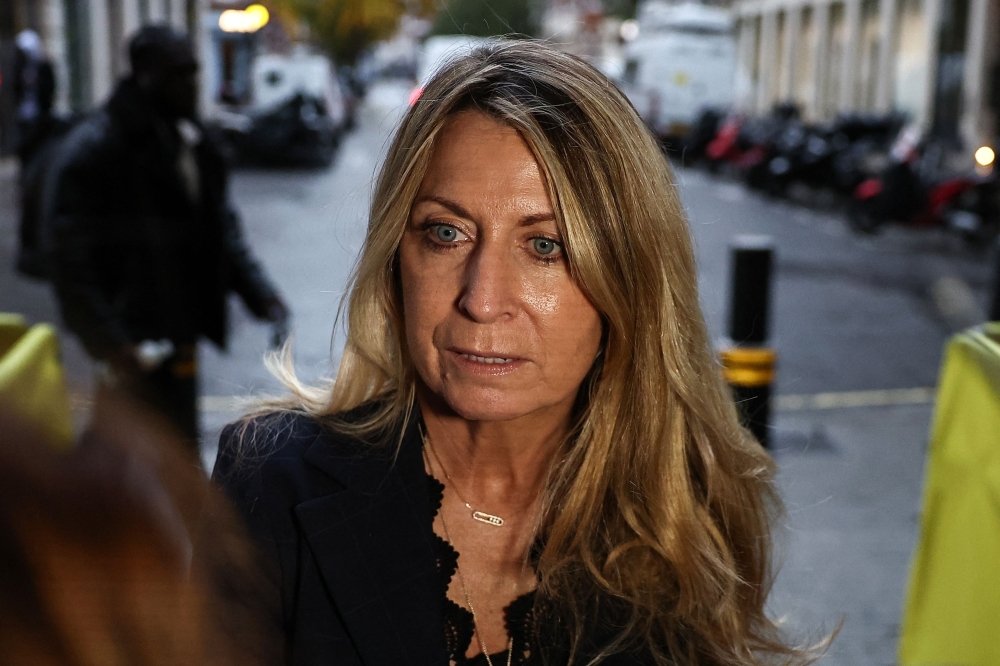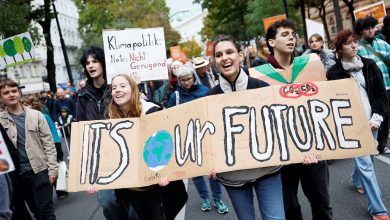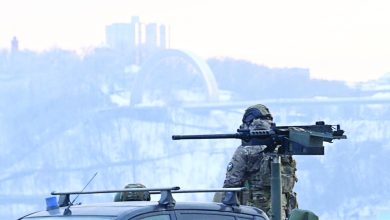Why the BBC is facing its gravest crisis in decades

LONDON — It is tempting to view the sudden resignation of two top BBC executives Sunday evening, in the wake of scathing criticism by the Trump administration, as an extraterritorial example of the intense pressure that President Donald Trump has put on broadcast news organizations in the United States.
But the British Broadcasting Corp. is not CBS or ABC, both of which settled lawsuits brought by Trump over their coverage of him. Its current crisis — the gravest the BBC has faced in decades — is less about Trump, experts said, than about the insoluble tensions of a renowned public service broadcaster operating in a bitterly divided political and media world.
Vilified by political enemies, who accuse it of chronic bias — in this case, to the left — and targeted by rival media firms, which resent its public funding, the BBC is a perennial football in Britain’s political contests. With its global reach, it regularly runs afoul of foreign governments as well, from India to the United States.
The BBC’s director-general, Tim Davie, and the CEO of BBC News, Deborah Turness, attributed their resignations in part to the tempest over a misleadingly edited documentary about Trump’s role in the Jan. 6, 2021, attacks on the Capitol. Their exits, however, followed a string of disputes over the BBC’s coverage of other sensitive issues, ranging from the war in the Gaza Strip.
“It’s a critical time for the BBC to be impartial because there’s not much impartiality in the world,” said Howard Stringer, a former president of CBS News who once served on the BBC’s board. “They clearly felt that taking on Trump was important, but in this case, it gave Trump an opening and it left Tim Davie exposed.”
“The BBC has more enemies than I had at CBS News,” Stringer continued, “because the government interferes and the British newspapers are a lot more competitive with the BBC than newspapers are in the U.S.”
None of this is to say that the BBC hasn’t aggravated its own problems. Its board chair, Samir Shah, apologized in a letter to a parliamentary committee Monday for what he described as an “error of judgment” in the editing of a documentary about Trump on the Panorama program.
The film, called “Trump: A Second Chance?,” which aired before last year’s presidential election, spliced together footage from comments Trump made about 50 minutes apart in a Jan. 6 speech, shortly before a riot broke out at the Capitol. Shah acknowledged that the editing “did give the impression of a direct call for violent action.”
The tardiness of the BBC’s apology has baffled current and former employees. Analysts said that if the broadcaster had simply owned up to the error quickly, it might have been able to contain the crisis.
The criticism was one of several about the BBC’s coverage raised in a wide-ranging and highly critical leaked memo by Michael Prescott, a journalist turned communications consultant who was an independent external adviser to the broadcaster’s editorial standards committee.
It prompted White House press secretary Karoline Leavitt to brand the BBC “100% fake news,” in an interview with The Daily Telegraph, which first published the memo by Prescott last week.
The BBC’s media editor, Katie Razzall, reported Sunday that a statement on the Panorama documentary had been “ready to go” for days, but that the BBC board had, for unknown reasons, prevented Turness from “putting out that apology,” causing Turness anger and frustration.
“Nature abhors a vacuum, and Donald Trump filled that vacuum,” said Jon Sopel, who covered Trump’s first term as the BBC’s North America editor.
Sopel, now a host of the podcast “The News Agents,” said he was always fearful of the cost of getting something wrong about Trump, given the BBC’s visibility and the president’s habit of lashing out at unfavorable coverage. “You do not leave any room for error; you just have to be scrupulous,” he said. “To find yourself out on a limb, with Trump mad at you, means you’ve lost.”
In his resignation statement Sunday, Davie did not mention the documentary, offering only a general admission that “there have been some mistakes made,” and that as director-general, “I have to take ultimate responsibility.” That did not stop Trump from labeling him and Turness as “Corrupt ‘Journalists’” on social media. On Monday, the BBC confirmed that it had received a letter from the president, threatening legal action.
Sopel, who knows Davie well, said his decision to leave was not entirely a surprise, even if the timing caught colleagues off guard. Ever since he was named director-general in 2020, Davie, a longtime BBC executive whose roots are in marketing, not journalism, has had to navigate one crisis after another.
In 2021, he apologized for a sensational interview of Princess Diana, conducted 25 years earlier by a BBC correspondent, Martin Bashir, after an outside investigator found that Bashir had deceived Diana’s brother, Charles, Earl Spencer, to obtain the interview.
In 2023, Davie was criticized for failing to act more swiftly in the case of Huw Edwards, a BBC anchor accused of sexual misconduct. Edwards later pleaded guilty to three counts of accessing indecent images of children.
The same year, Davie faced a mutiny after suspending Gary Lineker, a popular soccer broadcaster, from his weekly program. On social media, Lineker had likened the Conservative government’s policy for asylum-seekers to Germany’s in the 1930s. Davie reinstated Lineker before ending his contract in 2025 after a subsequent inflammatory post about Israel.
In 2024, Davie was back under a microscope for what critics said was a failure to deal with charges of unwelcome physical conduct and inappropriate language toward colleagues by the presenter of MasterChef, Gregg Wallace. Wallace was then ousted, with Davie observing, “Nobody is irreplaceable.”
The Israel-Hamas war brought a fresh raft of headaches. A 2025 documentary, “Gaza: How to Survive a War Zone,” came under fierce criticism, and Davie pulled the film from the BBC’s online player after saying he had lost faith in it.
Last summer, he was again on the defensive when the BBC did not cut away from Bob Vylan, an English punk rap duo, after they led the crowd at the Glastonbury Festival in chanting, “Death to the IDF,” referring to the Israeli military.
Claire Enders, a London-based media analyst who is a friend of Davie’s, said he once told her that his job at the BBC was like opening a Pandora’s box stuffed with unpleasant surprises every day.
“Every director-general has faced these issues,” she said, “but he has faced more of them because, during his tenure, the world has become much more divided.”
Before Trump entered the fray, the BBC was regularly targeted by a phalanx of right-wing opponents. Boris Johnson, the Conservative former prime minister, called for heads to roll shortly after Prescott’s memo was leaked.
“We have Britain’s national broadcaster using a flagship program to tell palpable untruths about Britain’s closest ally,” he posted on social media.
Nigel Farage, the right-wing populist who leads the anti-immigrant party Reform UK, accused the BBC of “election interference.” He said that he discussed the matter with Trump last Friday, and that the president had made his feelings known, “not in a quotable form.”
Despite the constant din of criticism, Enders noted that the BBC remained more trusted among viewers than the major U.S. networks, according to a recent study by the market research firm Pew Research. During Davie’s tenure, it has also prospered in entertainment programming.
The British government has offered the BBC qualified support, though Trump’s role in the drama has put Prime Minister Keir Starmer in an awkward spot. He has labored to avoid conflict with Trump on issues like tariffs and the war in Ukraine. On Monday, senior officials portrayed the outcry as a “teachable moment” for the broadcaster. Even the BBC’s staunchest defenders agreed.
“They made a mistake, and when they discovered it, they didn’t own up to it,” Enders said. “What’s best for the BBC is to have a reset and address these issues. For the BBC to manifest political bias is the most dangerous thing it could do in this world.”
This article originally appeared in The New York Times.



